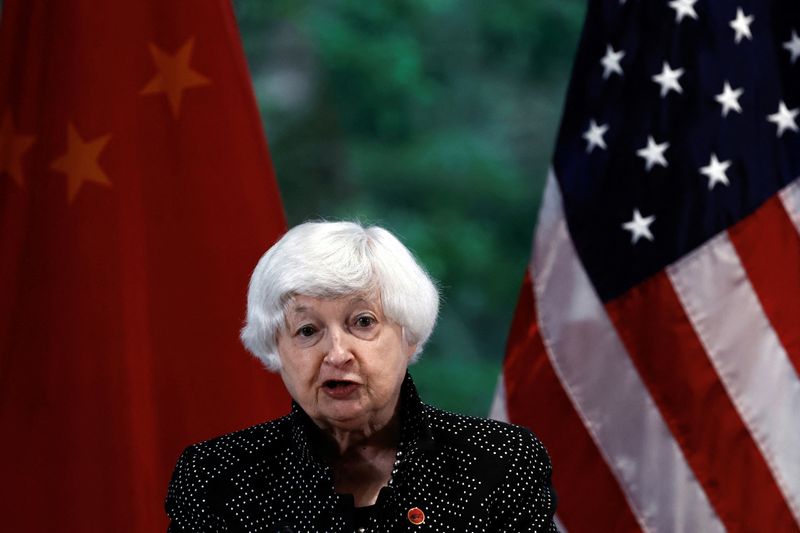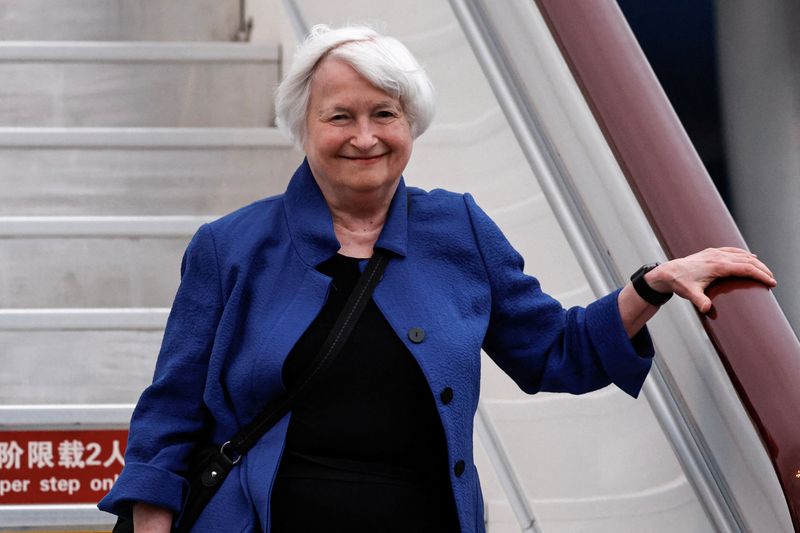By David Lawder
GUANGZHOU, China (Reuters) -U.S. Treasury Secretary Janet Yellen said on Friday that concerns are growing over the global economic fallout from China's excess manufacturing capacity, making the issue the main focus of four days of economic meetings with Chinese officials.
China is too large to export its way to rapid growth and would benefit by reducing excess industrial capacity which is pressuring other economies, Yellen said in remarks to an audience of about 40 representatives of the American Chamber of Commerce in Guangzhou.
"Overcapacity isn't a new problem, but it has intensified, and we're seeing emerging risks in new sectors," Yellen said in China's southern export hub of Guangzhou, where she met with Vice Premier He Lifeng and Guangdong Province Governor Wang Weizhong.
Yellen and other Biden administration officials are growing increasingly concerned about China's overproduction of electric vehicles, solar panels, semiconductors and other goods that are flooding into global markets in the face of a demand slump in China's domestic market.
She said that this is not healthy for China and is hurting producers in other countries, urging Beijing to shift away from state-driven investment and return to the market-oriented reforms that fueled growth in past decades.
FINANCIAL COOPERATION
While Sino-U.S. tensions over a range of issues have been escalating, Yellen highlighted areas of mutual interest in a dialogue launched during her first visit to China last July, including fighting climate change and illicit finance.
She said a financial working group representing both sides had been working on steps to contain the financial risks from a potential bank failure in either economy.
"We've held technical exchanges between our sides, including an exercise on how we would jointly deal with the failure of a large bank in the U.S. or in China," Yellen said, without providing additional detail on the findings of that review.
The U.S. and China announced the financial working group in September as a venue to discuss policy and exchange information. In January, the group met and discussed their respective resolution frameworks for large global banks, according to the Treasury Department.
China has set an ambitious economic growth target of 5% for 2024, fueled in part by more investment in new high-technology sectors as the economy struggles to overcome a property crisis and weak consumer demand. But many economists say China's growth model needs a major overhaul to boost domestic consumption and reduce its traditional heavy reliance on investment.
Yellen started her meeting on Friday with He by saying the two countries needed to communicate closely on difficult issues such as overcapacity and national security-related economic restrictions.
"It is what the world and our citizens expect from us," she said.
TARIFF GROUNDWORK
Some trade experts see the increased U.S. criticism of China's production-focused, subsidy- and debt-driven economic model as an initial step towards raising U.S. tariffs on Chinese EVs and clean energy goods to protect U.S. industry.
Yellen has shied away from raising any threats of new trade barriers, but said during her journey to Guangzhou she will not rule out more actions to protect a fledgling American supply chain for EVs, batteries, solar power and other goods from cut-price Chinese imports.
The Treasury is not expecting a major shift in Chinese policy as a result of Yellen's visit, but U.S. officials believe it was important to explain the risks that overinvestment in some sectors - and relatively weak consumer demand in China - present to both China's economy and its trading partners.
Yellen said on Friday that part of her aim on the trip was to cement a U.S.-China relationship that could "withstand shocks and challenging circumstances."
In addition to factory overcapacity, Yellen also said she would raise concerns about a deteriorating business climate in China for foreign companies, citing an AmCham survey that found one third of American firms in China reported unfair treatment compared to local competitors.
These include "imposing barriers to access for foreign firms and taking coercive action against American companies," she said, adding that ending such practices would benefit China.
CHINA STATE MEDIA PUSHES BACK
Chinese state media have pushed back against Yellen's excess capacity message, saying it was an example of a double standard.
"While it is just basic economics that surplus products naturally seek out markets elsewhere once domestic demand is met, and Western nations have been doing that for centuries, when it comes to China, it becomes an 'overcapacity problem' threatening the world," the China Daily said.
Yellen's meetings, which continue in Beijing on Saturday through Monday, come just after U.S. Commerce Department and Chinese Commerce Ministry officials met in Washington on Thursday.
The top U.S. official in those talks, Commerce Undersecretary Marisa Lago, also raised "strong concerns regarding growing overcapacity in a range of Chinese industrial sectors," the department said in a statement.

China's Vice Minister of Commerce Wang Shouwen raised concerns about U.S. tariffs on Chinese imports, sanctions and what he called the unfair treatment of Chinese companies due to national restrictions by the United States.
"The economic and trade relations between China and the United States should be a stabilising force," Wang said, according to a statement from the commerce ministry.
